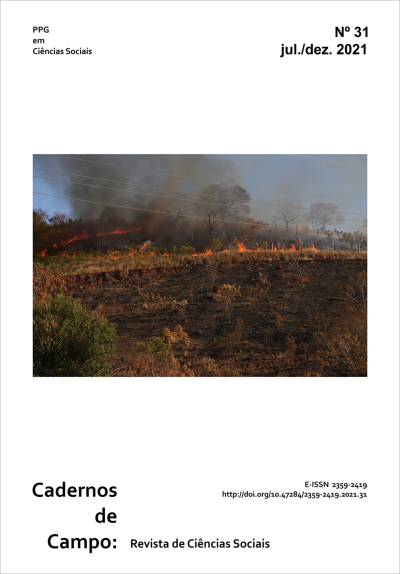Pluralizing governance from the perspective of the water-energy-food nexus
pathways to sustainability in the macro metropolis of São Paulo
DOI:
https://doi.org/10.47284/2359-2419.2021.31.7193Keywords:
water-energy-food nexus, governance of the nexus, Sustainability governance, Macro metropolis of São PauloAbstract
Based on the concept of "nexus,” the governance of water, energy, and food in the context of the Macro metropolis of São Paulo can be recognized as interdependent and very challenging in terms of trade-offs and synergies among resources. However, these resources have historically been governed separately, as there is a clear tendency for knowledge specialization in decisions. This article aims to critically discuss the “nexuses” between the governance of water, energy, and food in the context of the Macro metropolis of São Paulo. The methodology is divided into two moments. First, a narrative literature review, in which we present the concept of nexus governance and suggest rethinking it from a more plural perspective on governance given by the pathways to Sustainability approach. Second, a content analysis of the Project Portfolio of the Action Plan for the Macro metropolis of São Paulo 2013-2040 (PAM, in Portuguese) from five axes: political entities and spaces, structures and practice, power and knowledge, dealing with uncertainty, and political history, culture and context. The results indicate that PAM brings nexus-friendly perspectives marked by strategic and technical aspects, failing in considering more deeply human experiences of vulnerable actors in terms of access to resources in the context of a Macro metropolis.
Downloads
References
ALLOUCHE, J.; MIDDLETON, C.; GYAWALI, D. Technical Veil, Hidden Politics: Interrogating the Power Linkages behind the Nexus. Water Alternatives, Montpellier, v. 8, n. 1, p. 610-626, 2015. Disponível em: https://www.water-alternatives.org/index.php/alldoc/articles/vol8/v8issue1/277-a8-1-1/file. Acesso em: 08 mar. 2021.
ALVES, A. J. A revisão da bibliografia em teses e dissertações: meus tipos inesquecíveis. Cadernos de Pesquisa, São Paulo, n. 81, p. 53-60, 1992. Disponível em: http://publicacoes.fcc.org.br/index.php/cp/article/view/990. Acesso em: 08 mar. 2021.
AMARAL, M. H. et al. Environmental injustices on green and blue infrastructure: Urban nexus in a macrometropolitan territory. Journal of Cleaner Production, Amsterdam, v. 289, 2021. Disponível em: https://doi.org/10.1016/j.jclepro.2021.125829. Acesso em: 27 mar. 2021.
ARTIOLI, F.; ACUTO, M.; McARTHUR, J. The water-energy-food nexus: an integration agenda and implications for urban governance. Political Geography, Oxford, v.61, p.215–223, 2017. Supplement C. Disponível em: https://doi.org/10.1016/j.polgeo.2017.08.009. Acesso em: 27 mar. 2021.
BENITES-LAZARO, L. L. et al. Land-water-food nexus of biofuels: Discourse and policy debates in Brazil. Environmental Development, Amsterdam, v. 33, 2020. Disponível em: https://doi.org/10.1016/j.envdev.2019.100491. Acesso em: 27 mar. 2021.
CAIRNS, R.; KRZYWOSZYNSKA, A. Anatomy of a buzzword: the emergence of ‘the water-energy-food nexus’ in UK natural resource debates. Environmental Science & Policy, New York, v. 64, p.164–170, 2016. Disponível em: https://doi.org/10.1016/j.envsci.2016.07.007. Acesso em: 28 mar. 2021.
CANIL, K.; LAMPIS, A.; SANTOS, K. L. dos. Vulnerabilidade e a construção social do risco: uma contribuição para o planejamento na macrometrópole paulista. Cadernos Metrópole, São Paulo, v. 22, n. 48, 2020. Disponível em: http://dx.doi.org/10.1590/2236-9996.2020-4803. Acesso em: 28 mar. 2021.
COLLINGRIDGE, D. The social control of technology. London: Frances Pinter, 1980.
COVARRUBIAS, M. The nexus between water, energy and food in cities: towards conceptualizing socio-material interconnections. Sustainability Science, Tokyo, v. 14, n. 2, p. 277–287, mar. 2019.
CUMMINS, S; MACINTYRE, S. Food deserts: evidence and assumption in health policy making. BMJ, London, v. 325, p. 436-438, 2002.
DALLA FONTANA, M. et al. The water-energy-food nexus research in the Brazilian context: What are we missing? Environmental Science & Policy, New York, v. 112, p. 172-180, 2020. Disponível em: https://doi.org/10.1016/j.envsci.2020.06.021. Acesso em: 29 mar. 2021.
EMPLASA. Plano de Ação da Macrometrópole Paulista 2013-2040: Política de Desenvolvimento da Macrometrópole. São Paulo: Emplasa, 2014a. Disponível em: https://bibliotecavirtual.sdr.sp.gov.br/AbrirArquivo.aspx?ID=20358. Acesso em: 18 jan. 2022.
EMPLASA. Plano de Ação da Macrometrópole Paulista 2013-2040: Carteira de Projetos do PAM. São Paulo: Emplasa, 2014b.
GIATTI, L. L. Participatory Research in the Post-Normal Age: Unsustainability and Uncertainties to Rethink Paulo Freire’s Pedagogy of the Oppressed. Zurich: Springer International Publishing, 2019.
GIATTI, L. L. et al. Nexos de exclusão e desafios de sustentabilidade e saúde em uma periferia urbana no Brasil. Cadernos de Saúde Pública, Rio de Janeiro, v. 35, n. 7, 2019. Disponível em: https://www.scielo.br/j/csp/a/VzMkzg3YK9DsdyfZg4ZTgjS/?lang=pt. Acesso em: 18 jan. 2022.
GONÇALVES, L et al. O litoral da macrometrópole: tão longe de Deus e tão perto do Diabo. Desenvolvimento e Meio Ambiente, Curitiba, v. 54, p. 40-65, 2020. Disponível em: http://dx.doi.org/10.5380/dma.v54i0.69275. Acesso em: 29 mar. 2021.
JACOBI, P. R.; CIBIM, J.; LEAO, R. de S. Crise hídrica na Macrometrópole Paulista e respostas da sociedade civil. Estudos Avançados, São Paulo, v. 29, n. 84, p. 27-42, 2015. Disponível em: http://www.scielo.br/scielo.php?script=sci_arttext&pid=S0103-40142015000200027&lng=en&nrm=iso. Acesso em: 18 jun. 2020.
JASANOFF, S. Technologies of Humility: Citizen Participation in Governing Science. Minerva, Dordrecht, v. 41, n. 3, p. 223–244, 2003. Disponível em: https://doi.org/10.1023/A:1025557512320. Acesso em: 29 mar. 2021.
KHONDKER, H. Glocalization as Globalization: Evolution of a Sociological Concept. Bangladesh e-Journal of Sociology, Dhaka, v. 1, n. 2, 2004.
KURIAN, M. The water-energy-food nexus Trade-offs, thresholds and transdisciplinary approaches to sustainable development. Environmental Science & Policy, New York, v. 68, p. 97–106, 2017.
KURIAN, M. et al. Governance of Water-Energy-Food Nexus: A Social Network Analysis Approach to Understanding Agency Behaviour. In: HÜLSMANN, S.; ARDAKANIAN, R. (ed.). Managing Water, Soil and Waste Resources to Achieve Sustainable Development Goals: Monitoring and Implementation of Integrated Resources Management. Cham: Springer International Publishing, 2018. p. 125–147.
LEACH, M.; SCOONES, I.; STIRLING, A. Governing epidemics in an age of complexity: Narratives, politics and pathways to sustainability. Global Environmental Change, Oxford, v. 20, n. 3, p. 369–377, 2010.
LEACH, M.; SCOONES, I.; STIRLING, A. Pathways to Sustainability: an overview of the STEPS Centre approach. STEPS Approach Paper, Brighton, 2007. Disponível em: https://steps-centre.org/wp-content/uploads/final_steps_overview.pdf. Acesso em: 18 jan. 2022.
LEACH, M. et al. Understanding Governance: pathways to sustainability. STEPS Working Paper 2, Brighton, 2007. Disponível em: https://steps-centre.org/wp-content/uploads/final_steps_governance.pdf. Acesso em: 18 jan. 2022.
LEICHENKO, R.; SOLECKI, W. Climate change in suburbs: An exploration of key impacts and vulnerabilities. Urban Climate, Amsterdam, v. 6, p. 82–97, 2013.
RASUL, G.; SHARMA, B. The nexus approach to water–energy–food security: an option for adaptation to climate change. Climate Policy, Oxford, v. 16, n. 6, p. 682–702, 2016.
STIRLING, A. Developing ‘Nexus Capabilities’: towards transdisciplinary methodologies. Brighton: SPRU - Science Policy Research Unit, 2015. Discussion Paper.
STIRLING, A. Keep it complex. Nature, London, v. 468, n. 7327, p. 1029–1031, 2010.
TAVARES, J. Formação da macrometrópole no Brasil: Construção teórica e conceitual de uma região de planejamento. EURE, Santiago, v. 44, n.133, p. 115-134, 2018. Disponível em: http://dx.doi.org/10.4067/s0250-71612018000300115. Acesso em: 29 mar. 2021.
TORRES, P. H. C.; RAMOS, R. F.; GONÇALVES, L. R. Conflitos ambientais na Macrometrópole Paulista: Paranapiacaba e São Sebastião. Ambiente & Sociedade, São Paulo, v. 22, e0101, 2019. Disponível em: https://doi.org/10.1590/1809-4422asoc20190101vu2019l2ao. Acesso em: 29 mar. 2021.
TORRES, P. H. C; RAMOS, R. F.; POLLACHI, A. A macrometropolização em São Paulo: reterritorialização, reescalonamento e a cidade-região. Cadernos Metrópole, São Paulo, v. 22, n. 47, p. 103-122, 2020. Disponível em: https://www.scielo.br/j/cm/a/XJXvyShTMg6JQxTsQ34tfkp/abstract/?lang=pt. Acesso em: 29 mar. 2021.
URBINATTI, A. M.; FERREIRA, L. DA C. As políticas climáticas e seus desafios em megacidades. Ideias, Campinas, v. 10, p. e019001, 12 ago. 2019. Disponível em: https://periodicos.sbu.unicamp.br/ojs/index.php/ideias/article/view/8656195. Acesso em: 29 mar. 2021.
URBINATTI, A. M. et al. The conceptual basis of water-energy-food nexus governance: systematic literature review using network and discourse analysis. Journal of Integrative Environmental Sciences, Oxfordshire, v. 17, n. 2, 2020a. Disponível em: https://doi.org/10.1080/1943815X.2020.1749086. Acesso em: 29 mar. 2021.
URBINATTI, A. M. et al. ‘Opening up’ the governance of water-energy-food nexus: Towards a science-policy-society interface based on hybridity and humility. Science of The Total Environment, Amsterdam, v. 744, 2020b. Disponível em: https://doi.org/10.1016/j.scitotenv.2020.140945. Acesso em: 29 mar. 2021.
WAHL, D.; NESS, B.; WAMSLER, C. Implementing the urban food–water–energy nexus through urban laboratories: A systematic literature review. Sustainability Science, Tokyo, v. 16, p. 663-676, 2021. Disponível em: https://link.springer.com/article/10.1007/s11625-020-00893-9. Acesso em: 29 mar. 2021.
WEITZ, N. et al. Closing the Governance Gaps in the Water-Energy-Food Nexus: Insights from Integrative Governance. Global Environmental Change, Oxford, v. 45, p. 165-173, 2017. Disponível em: https://doi.org/10.1016/j.gloenvcha.2017.06.006. Acesso em: 29 mar. 2021.
WYNNE, B. Uncertainty and environmental learning: Reconceiving science and policy in the preventive paradigm. Global Environmental Change, Oxford, v. 2, n. 2, p. 111–127, 1992. Disponível em: http://tbauler.pbworks.com/w/file/fetch/48548191/Wynne_uncertainty%20and%20enviornmental%20learning.pdf. Acesso em 29 mar. 2021.
Downloads
Published
Issue
Section
License
Copyright (c) 2022 Cadernos de Campo: Revista de Ciências Sociais

This work is licensed under a Creative Commons Attribution 4.0 International License.









